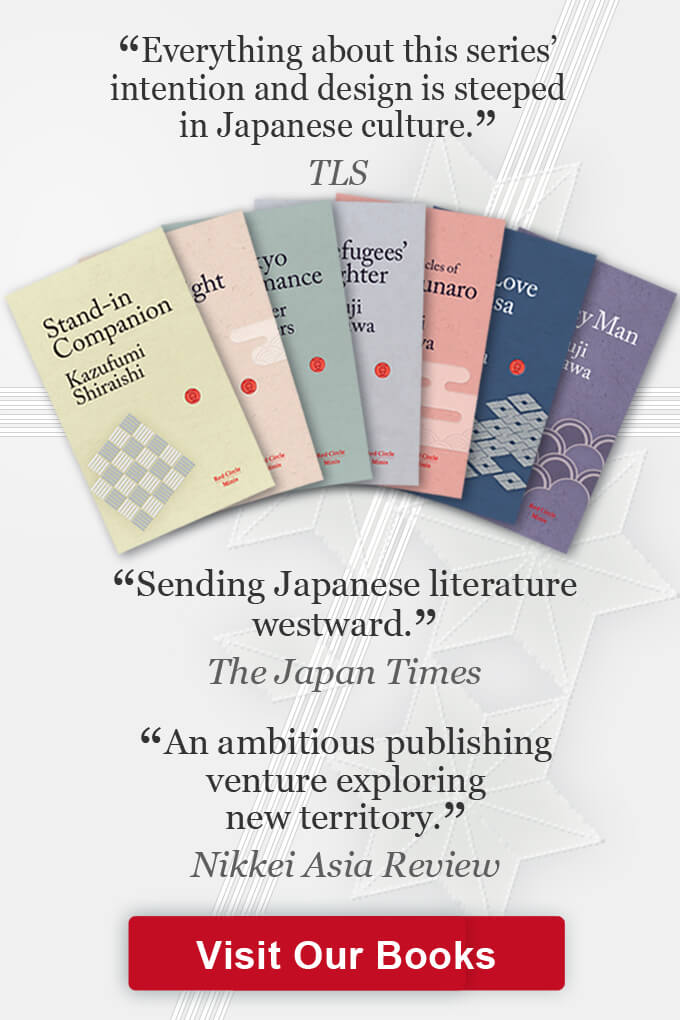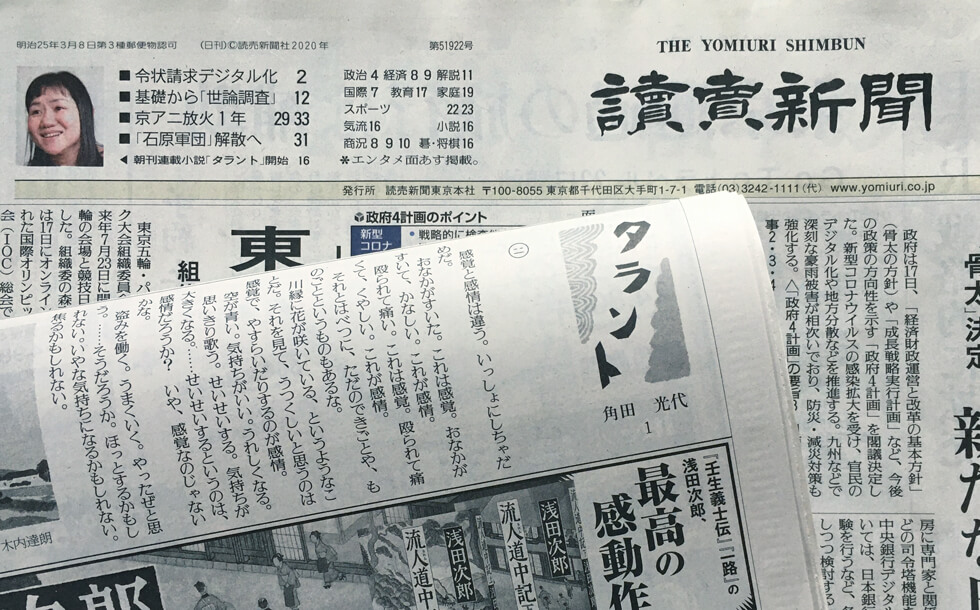 Copy of the morning edition of the Yomiuri Shimbun, 18 July 2020, featuring the first instalment of Mitsuyo Kakuta’s serialised novel, The Talents. The edition features a photograph of the author on the front page of the newspaper top left. Photo: Red Circle Authors Limited.
Copy of the morning edition of the Yomiuri Shimbun, 18 July 2020, featuring the first instalment of Mitsuyo Kakuta’s serialised novel, The Talents. The edition features a photograph of the author on the front page of the newspaper top left. Photo: Red Circle Authors Limited.It will take around a year for this new work from Kakuta, who is considered one of Japan’s most skillful authors and whose narratives are said to instantly captivate readers, to reach, what will no doubt be, an inspiring and exciting conclusion in the newspaper in April or May next year.
For the last few years Kakuta has been almost completely focused on updating and publishing a new version of The Tale of Genji, Japan’s oldest and perhaps best known classic work of fiction. Her re-telling follows in a long tradition of Japan’s most eminent authors updating this tale of ‘seduction’ for a new generation of Japanese readers.
The third and final volume of Kakuta’s edition, of this magnificently long and complex story originally written in the 11th century, was published in February this year; and is, according to the pundits, “seducing a new generation of readers and critics.”
The first instalment of The Talents was published on 18 July in the Yomiuri Shimbun, which boasts a readership of 8 million. The Talents was inspired by The Parable of The Talents, a biblical parable from the New Testament where a master divides his property among three servants before going away, despite the fact that Kakuta herself is not a Christian.
 Photo of the first instalment of The Talents by Mitsuyo Kakuta with illustration by Tatsuro Kiuchi published 18 July 2020 in Japan’s largest circulation newspaper, the Yomiuri Shimbun. Photo: Red Circle Authors Limited
Photo of the first instalment of The Talents by Mitsuyo Kakuta with illustration by Tatsuro Kiuchi published 18 July 2020 in Japan’s largest circulation newspaper, the Yomiuri Shimbun. Photo: Red Circle Authors Limited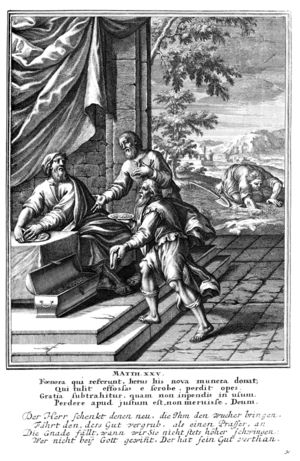 The Parable of The Talents, also known as The Parable of The Minas, depicted in a 1712 woodcut, showing two men bringing their money back to their master. The ‘lazy servant’ searches for his buried talent, while the two other servants present their earnings to their master. Source: Wikipedia.
The Parable of The Talents, also known as The Parable of The Minas, depicted in a 1712 woodcut, showing two men bringing their money back to their master. The ‘lazy servant’ searches for his buried talent, while the two other servants present their earnings to their master. Source: Wikipedia.Kakuta’s tale revolves around a woman, called Minori, the war memories of her 90 year-old grandfather, and Minori’s school-aged nephew. Minori’s family run an udon restaurant in Kagawa, an area in Japan located in the Seto Island Sea well known for its udon restaurants.
By masterfully weaving into the narrative the experiences of Paralympic athletes before the postponement of the 2020 Tokyo Olympic Games, Kakuta’s new work will sit within Japan’s canon of Olympic and sport literature.
Apparently, Kakuta hasn’t yet decided how The Talents will conclude. Like her devoted fans, who have been waiting years for a new work of fiction from her, she wants to see where the narrative takes her.
Kakuta’s last major work Front of Fist (Kobushi no Saki), completed just before she embarked on the marathon of updating, or as some like to describe it in Japan translating, The Tale of Genji into contemporary Japanese, was also serialised in a national newspaper, the Nikkei Shimbun, Japan’s business daily and the owner of the Financial Times, between 2014 and 2015.Font of Fist, a tale about boxing wasn’t Kakuta’s first hard-hitting narrative about the sport of boxing. It was, in fact a follow-up to her highly successful story Sky Fist (Sora no Kobushi), published in 2012.
Both these narratives are about the adventures of Kuuya, a sport-hating magazine editor who wants to be a literary editor but instead starts his writing career covering boxing, and unexpectedly gets sucked into the sport.
In the case of these two serialised works Kakuta, drew on her own personal experience. Like several other high profile Japanese authors, she enjoys endurance sports, and has been boxing for more than 10 years as well as running marathons. In her own inimitable style, she encourages readers to follow the example of the book-loving magazine editor with literary pretensions, and to fall in love with boxing.
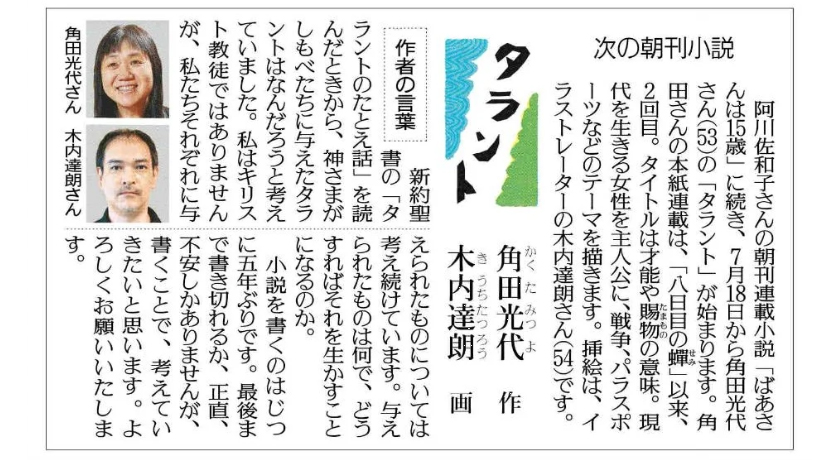 Advert promoting the forthcoming new work, The Talents, by Mitsuyo Kakuta (illustrated by Tatsuro Kiuchi) in the Yomiuri Shimbun as the newspaper’s next morning edition newspaper novel.
Advert promoting the forthcoming new work, The Talents, by Mitsuyo Kakuta (illustrated by Tatsuro Kiuchi) in the Yomiuri Shimbun as the newspaper’s next morning edition newspaper novel.In Japan, serialised novels have a long history and now play a very important and prestigious part in the professional lives of many leading Japanese authors; especially serialisations in such newspapers as the Yomiuri Shimbun, which claims to have the world’s largest circulation and published Japan’s first serialised “work of fiction” in 1877; and is also credited with inventing the Japanese genre of Newspaper Novels, Shimbun Shosetsu.
Major Japanese newspapers, like the Yomiuri Shimbun, have supported Japanese creative writing and storytelling with prizes, newspaper novels, Shimbun Shosetsu, and serialisations since the late 1800s and continue to do so.
The Talents, which most expect to be another heavyweight masterpiece from Kakuta, will be published by the Yomiuri Shimbun’s book publishing arm, Chuokoron, after the serialisation is complete.
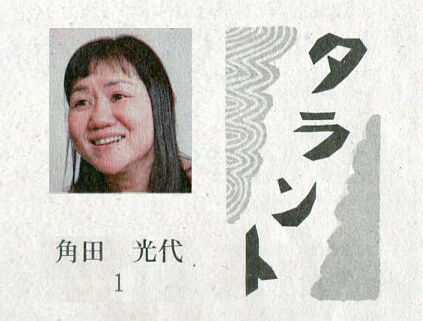 Photograph of Mitsuyo Kakuta alongside the title of her latest serialised novel, The Talents, in the Yomiuri Shimbun. Photograph: Red Circle Authors Limited.
Photograph of Mitsuyo Kakuta alongside the title of her latest serialised novel, The Talents, in the Yomiuri Shimbun. Photograph: Red Circle Authors Limited.The Japanese language serialisation in the Yomiuri Shimbun of The Talents, by Mitsuyo Kakuta, and the illustrations by Tatsuro Kiuchi, can be accessed here.
 About Red Circle:Red Circle Authors Limited is a specialist publishing and communications company that conducts bespoke projects on behalf of a carefully selected and curated group of leading Japanese authors. Red Circle showcases Japan’s best creative writing. For more information on Red Circle, Japanese literature, and Red Circle authors please visit: www.redcircleauthors.com.
About Red Circle:Red Circle Authors Limited is a specialist publishing and communications company that conducts bespoke projects on behalf of a carefully selected and curated group of leading Japanese authors. Red Circle showcases Japan’s best creative writing. For more information on Red Circle, Japanese literature, and Red Circle authors please visit: www.redcircleauthors.com.



